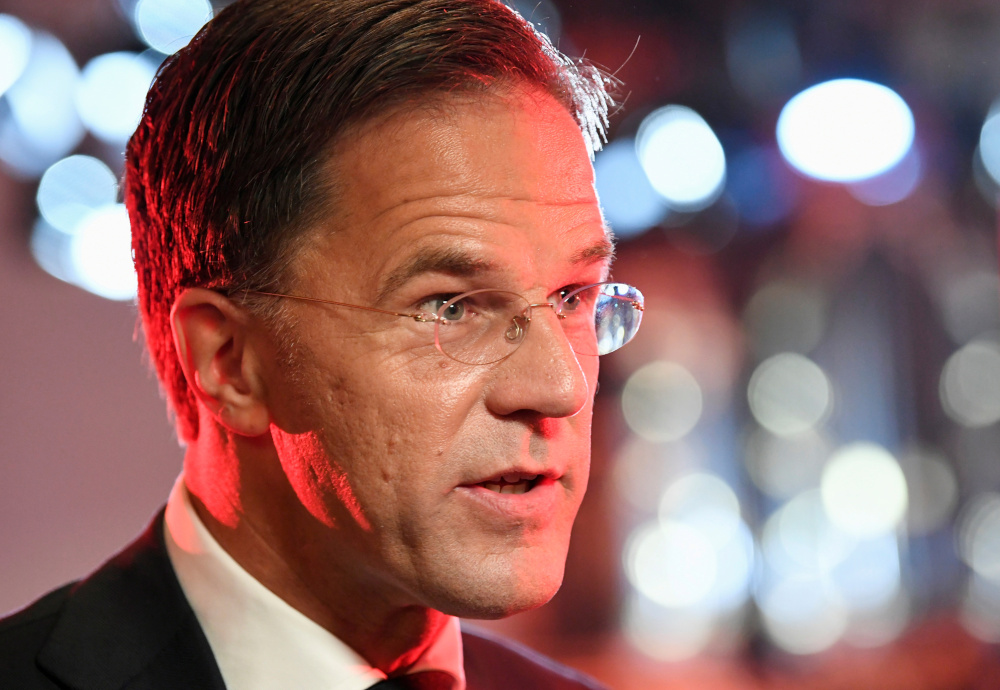THE HAGUE, Netherlands, Oct 30 ― Pressure is mounting on Dutch political leaders to put together a coalition government, which after 226 days yesterday became the longest formation talks on record in the Netherlands.
Experts say even the position of long-time Dutch Prime Minister Mark Rutte was by no means certain, even if he is still the most likely candidate to lead the country again after 11 years in power.
But seven months after Dutch voters went to the polls it was very much back to square one, with a future coalition government most likely resembling the one that stepped down in January over a childcare scandal.
Rutte’s third cabinet resigned in mid-January after news that thousands of Dutch parents were wrongly accused by Dutch authorities of fraudulently claiming child allowance.
Yet, Rutte’s cabinet stayed on in a caretaker capacity to handle urgent day-to-day business ― including dealing with the fight against the coronavirus.
But now “pressure is high to form a new cabinet soon,” said Ruud Koole, political science professor at Leiden University.
“Issues like the housing crisis, climate change and energy transition, the nitrogen crisis need governmental action, for which a new cabinet is badly needed,” Koole told AFP.
“However, it’s not sure that they will succeed,” Koole said.
Souring Relations
Far from being punished by voters in March over the childcare scandal, Rutte’s centre-right VVD party won 34 seats in the 150-seat lower house of parliament.
The progressive-left party of Sigrid Kaag, who then served as foreign minister, won 24 in second place.
The stage seemed set for a VVD-D66 coalition, but the question remained which other parties were needed to form a 76-seat majority.
Rutte, 54, too, seemed set once again to take the helm of his fourth cabinet, despite dodging the childcare and a series of other political scandals, earning him the nickname of the “Teflon Prime Minister”.
But as time dragged on, relations between the VVD and D66 soured, particularly after Rutte was caught lying to the press over a possible cabinet position for Pieter Omtzigt, a no-nonsense CDA MP who first exposed the childcare scandal.
Kaag at the time supported a “motion of disapproval” against Rutte, saying she would have stepped down if in Rutte’s shoes, and she questioned his business-like leadership style.
Ironically Kaag herself was forced to quit a few months later as foreign minister in Rutte’s cabinet, when MPs accepted a similar motion over the Dutch government’s handling of the chaotic withdrawal of its forces from Afghanistan.
Meanwhile, attempts by D66 to rope in the left-wing labour and greens parties into a coalition were shot down by the VVD and the two former coalition Christian Democratic parties -- the VVD’s choice of partners.
In turn, D66 said its policy to allow voluntary euthanasia for people over 70 clashed with that of the conservative Christian parties.
‘Big Unknown’
Yet, this week the leaders of the four original ruling parties ― VVD, D66, CDA and CU ― again met for talks, with experts saying the original coalition combination was the only likely one.
Failure to succeed would most likely lead to new elections, they said.
“De facto, real negotiations are just under way. Lots of time was needed to repair personal relationships and internal party problems,” said Claes de Vreese, politics professor at the University of Amsterdam.
“None of the four parties really want elections now,” De Vreese added.
Even the VVD, still strong in the polls, showed losses earlier in the year “and Rutte is vulnerable,” he said.
Although he was the most likely candidate to be appointed as “formateur”, the person responsible for putting together a new cabinet, Rutte’s position was by no means assured, the experts said.
“That’s the big unknown,” said De Vreese.
“Can Rutte change and be a ‘new leader’? In some ways he has the capacity: he is a flexible chameleon, but is it real and sufficient?” he asked.
The experts say progress was made ― albeit slowly.
“There is some light at the end of the tunnel,” said Koole. “But success is not guaranteed.” ― AFP






















